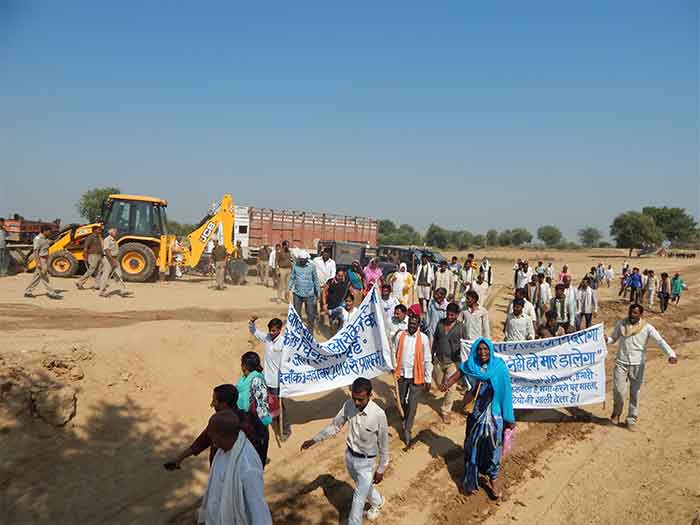
“ As long as river-sand was being used only for construction needs of village there was no problem at all in this use. Problems arose when sand started being mined from here to meet the massive needs of big cities.”
We were sitting in a group meeting under a tree in Bundelkhand region. The subject was to prepare a memorandum on protecting a local river from excessive sand mining.
Earlier persons involved in the mining of sand, who are very rich and influential, had responded that construction activity is very important for society. The sand of this particular river is of very good quality. Hence it must be mined in the larger interests of society. Anyone who obstructs development should be held guilty of hindering development and suitable action should be taken against him.
The group meeting was being held to decide the response to this argument. As one villager after another explained, there are limits to which sand can be taken from river. But there is no limit to how much the contractor wants to take out. He wants to take out the maximum in the shortest time to maximize his profits and does not think about any other aspects. As he wants to extract more and more quickly, so he thinks all the time of methods which can facilitate this. He brings in more and more heavy machines which hurt the river more. He brings in heavy vehicles many times a day destroying crops. If this continues the river will be depleted and ruined after some time. For a long stretch people and animals will be deprived of water. The entire region, its people, farm animals, wild animals will suffer just because a contractor has to get his high profits, he is able to give bribes to powerful persons to facilitate this and can hire goons to prevent any on-site opposition.
To prevent such excessive pressure on a local eco-system that transcends its boundaries and hence endangers it, effective systems should be in place. In examples such as this, regulation can come from the panchayat/gram sabha/ appropriate rural decentralization unit, or else it can come from the administration. But when some of these systems are too weak and others are corrupted most of the time, then chances of timely and effective intervention are very less.
Let us take a different kind of example of a situation in which information of a very popular use of a herb which grows in a forest near a cluster of villages is spread widely outside these villages. This may be done with good intentions by someone of getting better income for villagers who can collect the herb growing in the forest and sell it, getting a better price than before.
So far, so good. But the traders making more money from the herb do not know at which limit to stop, and are not keen to know this. They will like to maximize their sales and if the villagers cannot supply enough, they may send others to get it. Others may not know how to get the herb without causing damage. There may be much unnecessary and excessive digging and damaging of other plants as well, ultimately leading to the degradation of the entire forest and the mixed biodiversity conditions in which the herb could grow easily and acquire its special medicinal properties.
In many such cases, fragile ecosystems are all the time getting disrupted under the burden of excessive market pressure. Sometimes judicial intervention saves the situation, sometimes an honest and courageous official stands out as protector, sometimes a voluntary organization plays the savior, sometimes village communities act on their own to save the situation. But the combined impact of all these interventions is on the whole quite limited and so many fragile ecosystems continue to deteriorate or even face almost complete collapse and ruin. The combined impact of many such collapses or near collapses takes a very important form and threatens survival conditions at wider level.
Bharat Dogra is a journalist and author. His recent books include Planet in Peril and Protecting Earth for Children.
GET COUNTERCURRENTS DAILY NEWSLETTER STRAIGHT TO YOUR INBOX
















































